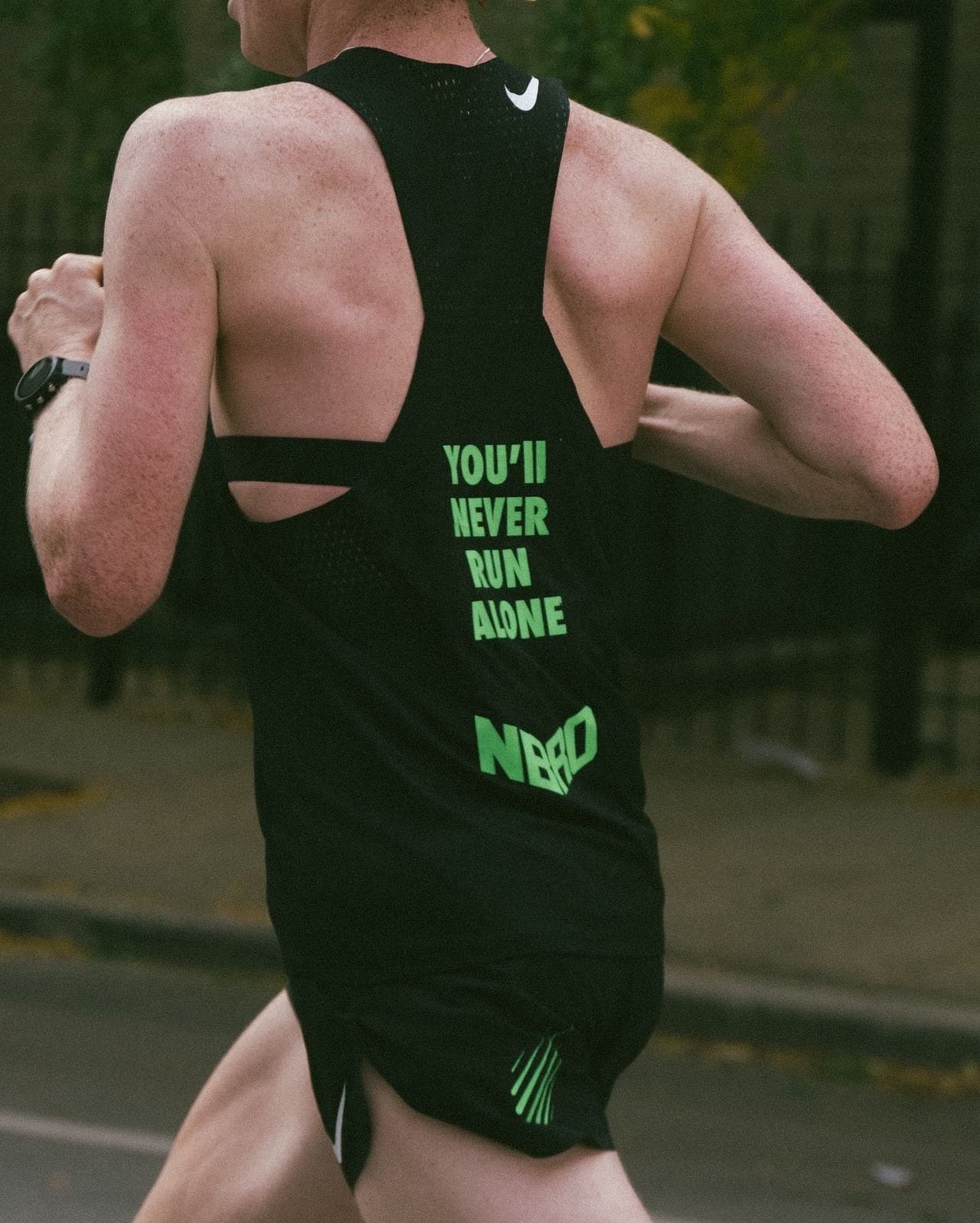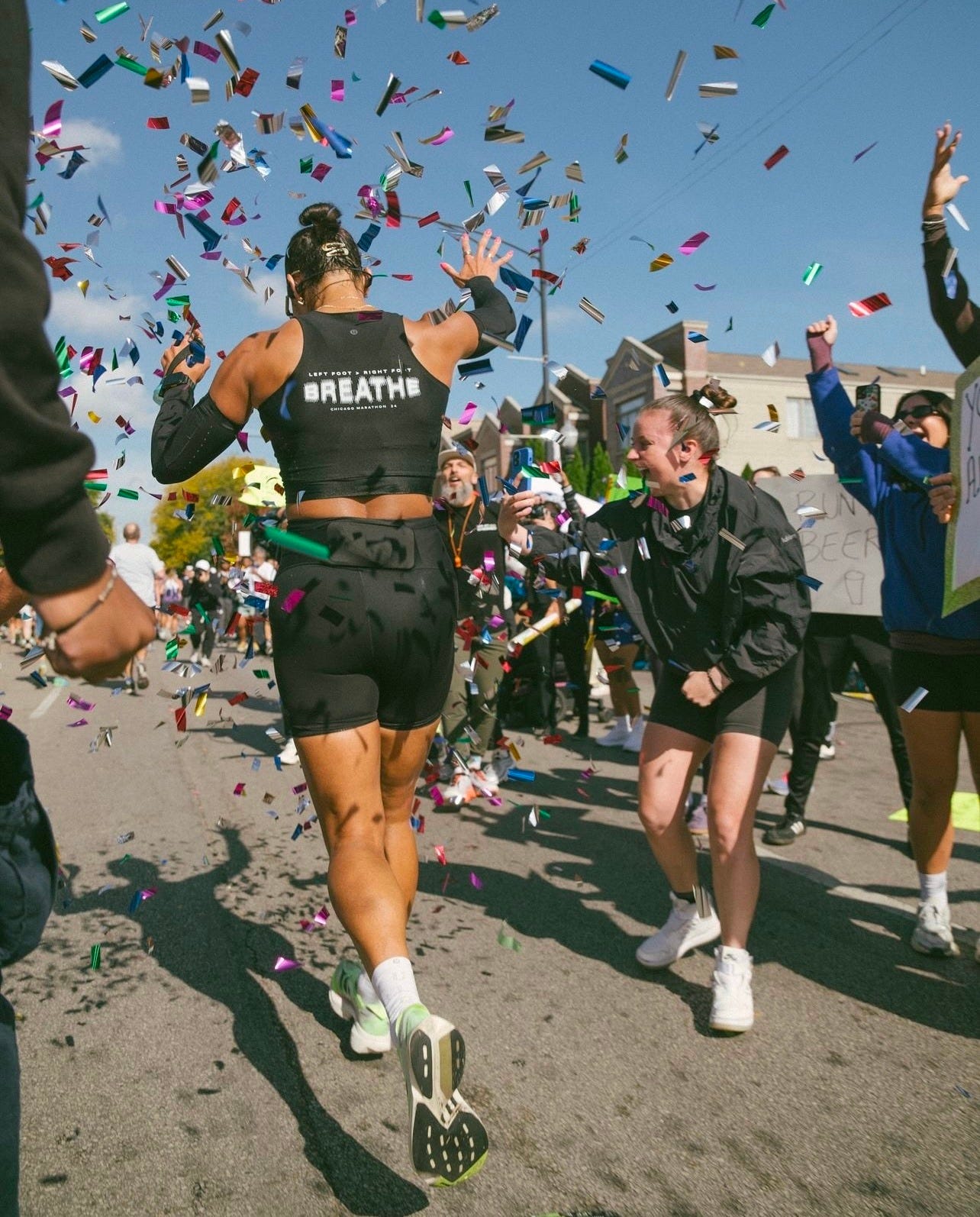Wellness Check: A Guide To Going To The Run Club
Don't be a dickhead. Hope this helps!

Did you meet your future wife at the run club this summer? Or, perhaps you were looking to smash and dash? Was your shorty waiting for you at the finish line or did you just end up run through? No. Is that her? Not the 10 min pace group cutie at the mile 20 cheer section with a 7 minute mile hottie? Nooooo.
As a single sex and culture (and travel and wellness and tech and whatever else I feel like) writer in New York City, I couldn’t help but wonder, had cuffing season become the prelude to marathon season this year because everyone went to the run club once in July?
Inescapable as the over zealous 34 year old that never played a team sport racing you to the red light on an easy-paced weekly group run, run community content had TikTok and Instagram algorithms in a chokehold this summer and somehow managed to make this typically unassuming group fitness activity very horny. Among all the content about perfect 10’s at the run club, playing dumb at the run club and content creators that pivoted their entire personality to being thirsty at the run club, videos from Lunge, the very viral group dressed in all black stuck out.
While I typically keep my culture writing for media outlets, sometimes I simply have more to say or more reporting that doesn’t make the final piece. I’ll publish those additional thoughts here on The Soft Serve on occasion.
This would’ve been more timely over the summer, but the discourse has largely been a masterclass on how to show up to a run club and make an ass out of yourself. There are ways to avoid that, join the community, improve your running, widen your social circle and perhaps even meet someone without being that guy (gender neutral) at the run club.
Run Clubs Are Not The New Dating App, But Lunge Is A Dating App
For this story I worked on for Men’s Health, I ended up connecting with 23 year old Brendan Willsch right after his first time running with Lunge. As someone that typically runs alone to clear his mind, he thought it could be a good opportunity to get out and meet new people in a social setting. He isn’t necessarily looking for a relationship.
Upon joining the oversized group in Washington Square Park on a hot Wednesday in July, Willsch and everyone else was greeted by dating app founders Steven Cole and Rachel Lansing. Cole’s background is in investment banking and Lansing is a former fitness instructor. As mentioned in my MH story, they thanked everyone for coming and making Lunge bigger than they could’ve imagined. From there, the VC bro and his counterpart encouraged everyone to sign up for the app and attempt to find the people at the run on the app.
(To avoid any confusion and passive voice here, this completely defeats the purpose of socializing in person, but Lunge is a for profit startup that leveraged run club culture and paid social to market themselves.)
With no warm up, cool down, IRL mingling prompts or safety instructions from the Lunge team to the hundreds and hundreds of runners that pulled up, Lunge is a dating app with a weekly run activation at best. It’s the concept that success on dating apps is purely a numbers game manifested on Manhattan’s west side highway.
To apply the same intention and tout a run club as a reasonable replacement for a dating app where a snap judgment and the simple swipe of a finger initiate a connection is undeniably misguided. For outsiders and newbies looking in, I suppose you can kind of bend your brain around the allure – a bunch of fit people sweating and getting their endorphins up doing a healthy activity together. Behaviorally, they’re diametrically different.
With the decline of dating apps and the loneliness epidemic raging on, Lunge’s social ads seemed to attract hordes of single young New Yorkers trying to meet people. It’s a healthy third space (no defined space necessary) where everyone is half-dressed, and it’s free.
For those that managed to remain unfamiliar, run clubs, communities or group runs are essentially a social run. Running etiquette and social etiquette are both essential and often reinforced week over week. The centerpiece of a run club is the run, which is typically three or more miles. Yet, let this summer’s TikTok or IG content tell it would have been easy to assume it’s simply fucking.
Due to the massive turn out from Lunge’s paid social campaign and the onslaught of run club content the algorithms forced on everyone, plenty of media outlets and non-runners ran the idea that run clubs are the new dating app into the ground, which sent a bunch of new people racing to the nearest run community to fuck around and find out, and find out they did.
“First of all, I’m disgusting. I’m covered in sweat. Second of all, people are having first date conversations while running,” Chelsea Jacobson, a comedian and writer in New York lamented in an Instagram Reel she posted in her black top after leaving Lunge. “I’ll just freeze my eggs. I’d rather go through hormone therapy and an egg retrieval.”
Run clubs’ meteoric rise in popularity framed the fitness subculture like the replacement for dismal dating apps, when in reality they're an existing social scene that the mainstream caught wind of and descended upon. Much like any other social ecosystem, friendships and romantic relationships (and perhaps even an arch nemesis or two) are inevitable. The thing is, those connections are built at about the pace your endurance and speed increases – slowly, with time and effort. Perhaps a conversation or ten over a couple runs.
How To Show Up To The Run Club
Amir Gamble attended a variety of run groups starting in 2022 as Covid restrictions lifted in NYC. “I run by myself a lot, and that’s nice, but because I do run a lot I was wanting to do it socially,” he said. As we entered our new normal, group runs seemed like a low pressure social activity for Gamble.
Years later the 33 year old still consistently goes to different groups depending on what he’s looking for – a conversational pace or those that are “really getting after it” with speed work or more focused training workouts. In New York, there’s an entire ecosystem of groups he can go to for a variety of workouts when he’s looking to run with others.
Additionally, socially they vary. Some are clique-y and competitive while others are more welcoming – the dynamics differ group by group. Running with people is more like parallel play with encouragement or support than the format of a first date.“[It’s assumed] people go to a running club just to date and hook up or whatever. That’s not even true, not nearly as much,” Gamble said. It happens, but people aren’t typically pulling up with the same intention as the fire up the dating apps.
“As a lifelong athlete, and now coach, I understand the importance of movement, the benefit of movement for longevity, for mental health or wellness, and for connecting to yourself, connecting to other people and connecting to the community at large that you're in,” Jessie Zapotechne, a performance running coach who is head of adidas’s U.S. running communities and founder of women’s-only group Girls Run NYC.
With so much positioning run communities as meat market, the concept of community and what that actually looks like got overrun along the way. At the lowest level every run should have a warm-up, cooldown, communicated safety and road etiquette protocols, and acknowledgement of hydration. Zapotechne highly recommends looking into groups that have a more integrated approach.
“We actually did a holistic wellness night where we had a recovery partner there that was teaching about foam rolling and PT, and everyone had an opportunity to try out Normatec boots,” she said. They also brought in a mindset specialist to talk about mental performance.
Beyond the weekly workouts, more established runs have other community events which are great opportunities to build new relationships. “We often bring our club together to have cheer sections at races, so that the people in our group who are racing have support from the other people in the group who are not,” Zapotechne. “We have this phrase that's pretty commonly used. ‘If you don't run, you cheer.’” Whatever level of runner you are, there’s a place for you to give and receive support.
Considering run clubs are free and the messaging has largely been around chasing ass, there are great ways you can show up and bring something to the table besides your thirst. “Just showing up is contributing,” Zapotechne said. People go to a social run for togetherness. “You're going because you want your friend to be there, or you want the accountability of the other folks who come. Showing up is the first way that people are part of a community.”
As someone that’s been to plenty of group runs, Gamble says, with knowledge of running etiquette or group runs, you can offer support in that way. This can look like helping new attendees with a route you’re familiar with or knowing how to stop the groups approaching a light within street traffic, but he said there are also other opportunities to contribute. “Sometimes there are guys who are photographers that show up and they bring their camera,” he said. “I think that's like a sick exchange for the group.”
Beyond bringing your best energy to the group, most groups take monetary donations. You can buy merch. Promote events. Not only is it a community, but this free thing you’re joining weekly takes time, effort and care from organizers. Appreciation can come in many forms, and it’s helpful if they’re beyond verbal affirmation.
Meeting new people may turn into something more, especially as you share space accomplishing goals, being supportive and taking on new challenges together. Realistically, like in literally every social setting, some people are probably going to hook up, but the social dynamics of a run club are no different than any other social club, intramural sport or adult hobby. All of the same archetypes exist. (Are you trying to make moves on the ceramics class baddies day one? No. After a few weeks? Perhaps.)
For most, it’s less about chasing ass and more about establishing and maintaining healthy routines within a like-minded group. Every run club does not function like a dating app, and pulling up assuming it will is going to socially put you in last place . You could, however, practice socializing in person at the run club rather than resorting to an app to race into someone DMs.



